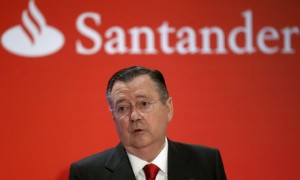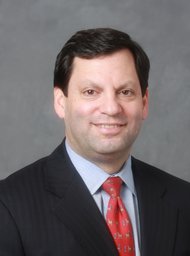
Santander CEO Alfredo Saenz has resigned after a long-running governance dispute in Spain. Photograph: Juan Carlos Hidalgo/EPA
Stephen: More evidence of major change in the world’s upper financial realms, as these two stories show. Thanks to Lance.
Santander Chief Alfredo Sáenz Resigns
By Giles Tremlett in Madrid and Jill Treanor, The Guardian – April 29, 2013
http://tinyurl.com/cdbso3k
One of Europe’s most powerful bankers, the Santander chief executive, Alfredo Sáenz, has resigned after a long-running row about whether he should be banned from heading the eurozone’s largest bank.
The shock replacement of 70-year-old Sáenz by internal candidate Javier Marín comes just two weeks after the Bank of Spain ordered a review into whether or not he would meet new rules governing bank executives with criminal convictions. Sáenz was convicted in 2009, and handed a three-month suspended jail sentence, for deliberately making false allegations against four businessman who owed money to his previous bank, Banesto.
The businessmen were remanded in jail in 1993, but later proved their innocence. Sixteen years later they won a case against Sáenz. Under Spain’s banking rules at the time, the sentence automatically meant he would have been declared unfit to run a bank as soon as the appeal process ran out.
The court declared that Sáenz “knew the allegations were false, including those in later versions of the writ”. The Socialist government of José Luis Rodríguez Zapatero tried to pardon him, stating that this also included wiping out his criminal record, thus allowing him to continue at Santander. But that was struck out by the supreme court, which declared that governments could not wipe a criminal record.
On 12 April, the current conservative government of Mariano Rajoy changed the law to ensure that those with criminal records were not automatically banned from senior bank jobs. However, the law left the decision with the Bank of Spain on Sáenz’s credentials and opened a new formal inquiry a few days later. A decision had been expected in May.
The government said the new law was meant to reflect European Banking Authority guidelines, which nevertheless state that “criminal or relevant administrative records should be taken into account”.
Santander sources at the time said that Sáenz remained energetic and hard-working, so his resignation seemed unlikely to have anything to do with his health. He takes away an €88m (£74.2m) pension pot.
El País on Monday reported that the finance ministry had been opposed to allowing Sáenz to continue at the bank.
Santander has quadrupled in size since Sáenz took over as CEO in 2002, expanding into Britain by buying Abbey National, Alliance & Leicester and much of Bradford & Bingley, rebranding them with the Santander name.
“The board of directors expressed its recognition of and gratitude for Alfredo Sáenz’s extraordinary achievements,” a company press release stated.
Sáenz’s role as chief executive is more akin to that of a chief operating officer – Emilo Botin remains executive chairman of Santander. His daughter Ana Botin runs the UK arm of Santander. Santander wants to float off the UK arm but the move has been delayed until next year at the earliest. Marín, 46, was CEO of Banif in Spain until 2007, when he joined Santander.
Top Lieutenant of Dimon Is Departing JPMorgan
By Jessica Silver-Greenberg, New York Times – April 28, 2013
http://dealbook.nytimes.com/2013/04/28/key-executive-said-to-be-leaving-jpmorgan-chase/
A senior executive in the inner circle of Jamie Dimon, JPMorgan Chase’s chief executive, is leaving, the latest departure after the bank reported a multibillion-dollar trading loss last year.
Frank J. Bisignano, co-chief operating officer, will become chief executive of First Data Corporation, a payment processing firm, Mr. Dimon said in a statement on Sunday. The trading losses at the bank, the nation’s largest, have swelled to more than $6.2 billion since they were first disclosed almost a year ago.
Mr. Dimon said Matthew E. Zames, who shared the role of chief operating officer with Mr. Bisignano, would take over all aspects of the job, effective immediately.
“He is a proven business executive, who has performed exceptionally well since coming into his corporate role in May of last year,” Mr. Dimon said.
Mr. Bisignano’s departure is voluntary, according to two people close to the bank, adding that the top post at First Data would be a perfect role for him.
His departure is less fraught than others during more tumultuous periods, these people say. Ina R. Drew, who ran the chief investment office, the unit at the center of the huge trading loss, resigned under pressure in May last year, for example.
The bank is well positioned to make the shift more seamless, these people added, saying Mr. Zames enjoyed widespread confidence.
JPMorgan reported record profit in the first quarter, buoyed by gains in investment banking and a surge in mortgage lending. With Mr. Bisignano’s departure, the ranks of executives who once surrounded Mr. Dimon as he helped steer the bank through the 2008 financial crisis will be even thinner. Several other executives have already left, including Heidi Miller, James E. Staley, William T. Winters and Steven D. Black.
Mr. Bisignano was promoted to co-chief operating officer last July as part of a broad reshuffling of management. During his time at JPMorgan, Mr. Bisignano gained a reputation as a kind of Mr. Fix-It. His reputation had not been tarnished by the outsize bets made by traders in JPMorgan’s chief investment office.
He took the reins of JPMorgan’s floundering mortgage unit in 2011, just as the bank was grappling with thorny legal issues, including investors who accused the bank of selling shaky mortgage-backed securities that later imploded.
To root out the problems, Mr. Bisignano revamped the mortgage unit and announced a policy to address cases in which JPMorgan had wrongfully foreclosed on active-duty members of the military, a violation of federal law. He was a skilled manager, and he kept a tight watch over the mortgage operations.
Mr. Bisignano is leaving at a challenging time for JPMorgan, which once held special sway with federal regulators, in part because the bank largely sidestepped the financial crisis.
Now, JPMorgan is facing a criminal inquiry about whether it misled investors and regulators about the botched derivative trades. Besides that inquiry, JPMorgan is facing investigations by at least eight federal agencies, including the Federal Deposit Insurance Corporation, the Commodity Futures Trading Commission and the Securities and Exchange Commission, according to people with direct knowledge of the matter. Prosecutors are examining a variety of issues, including possible breakdowns in the bank’s controls to prevent money-laundering activities.
The bank is also working to bolster its risk and compliance controls, while seeking to repair frayed relationships with regulators in Washington. The breakdown between JPMorgan and its primary regulator, the Office of the Comptroller of the Currency, was illuminated during a Senate hearing in March and in a report by the Senate’s Permanent Subcommittee on Investigations, which described a bank that sometimes took a defiant position with regulators.
Mr. Dimon has testified before Congress about the trading losses and has repeatedly apologized for the bank’s mistakes.
In his annual letter to shareholders this month, Mr. Dimon remained contrite, vowing to continue improving risk controls while again expressing that the bank had “let our regulators down.”
Mr. Dimon promised to redouble efforts to fix compliance problems. “We are reprioritizing our major projects and initiatives,” he said.
via Golden Age of Gaia
